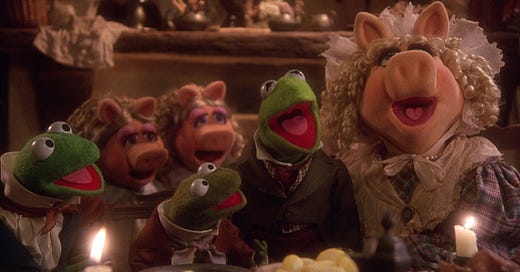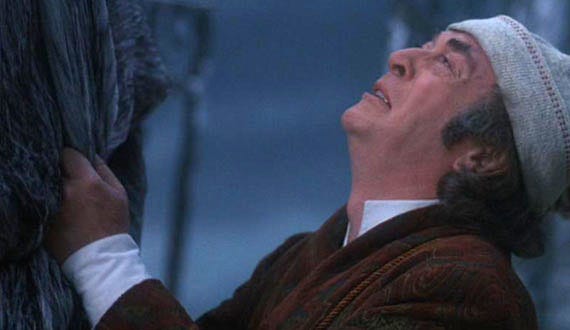Everything I Need to Know About Christmas I Learned From The Muppets
A Muppet Christmas Carol and the topsy turvy idea of incarnation
Here’s a Christmas hot take for ya: The Muppet Christmas Carol is not just the BEST Christmas movie, but also the best film adaptation of Charles Dickens’ classic story. Not only is much of the dialogue verbatim from Dickens’ story, not only is the movie filled with absolute BANGERZ (just try not to cry while Tiny Tim sings “Bless Us All”), but you have SIR MICHAEL CAINE absolutely COMMITTING to his Muppet costars. He scowls, he cries, he sings, he leaves it all on the field.
As I was rewatching this classic with my kids, I was struck by the relevance of Dickens’ story for our time. Much of his work was devoted to exposing the underbelly of Victorian society—vast sums of wealth accumulating in the hands of the few due to the exploitation of many. As I watched Scrooge begrudge his workers adequate heating, it brought to mind our current spate of billionaires who seem far more concerned with mega-yachts than the plight of the poor, or even the working conditions of their own warehouses.
But here’s the lesson of A Christmas Carol: the wealth you think of as protection is actually a prison. Scrooge was a lonely boy who grew up to be a miserly man, so worried about maintaining his dominance (and wealth is always a form of domination) that he fails to see the truth of his situation. In the beginning we see a Scrooge sitting alone in the dark (because candles are expensive, yo!) eating a sad version of girl dinner. After his ghostly visitation, we’re left with the image of Scrooge enjoying a feast with family, friends, and coworkers. The second image is far happier, still, so many of us cling to lonely darkness, imagining that hoarding wealth and privilege is the key to our happiness. We think “if I just had $10,000 more” or “when I just get that promotion/new car/new house/big vacation, then I’ll be happy.” But that’s not really how life works, is it?
In a world ordered by dominance and exploitation, it probably makes a certain amount of sense to try and insulate ourselves from that exploitation by hoarding resources. But the weird truth is that in order to be happy, we need not to accumulate power, but to give it away. Because what we need is community, and you can never be in true community with those you seek to dominate.
Which brings us to the OG Christmas story and its weirdest part: the incarnation. This is the idea that God would give up God’s power to take on the form of a baby. And not a rich, privileged baby, but a baby born out of wedlock to marginalized teen parents—the lowest status available, basically. I don’t know if I believe this story literally; I don’t think that’s necessary to see its power: a love that is so compelling that a god would willingly give up their power to come close to the beloved.
Throughout the stories of Jesus’ life we see someone who insists not on domination, but inclusion. Every person whom the religious authorities of the day tried to exclude, Jesus said no, bring them close. Children? Yes. Corrupt tax collectors? Yes. Adulterous women? Yes. His fellow countrymen were waiting for a military leader who would overthrow their Roman occupiers, instead they got a guy who liked to invite randos to dinner. One of his last acts before being executed by the state was to wash his friends’ feet.
Most churches have turned their back on the spirit of incarnation. The church has sold out its values in exchange for political influence, and, for being followers of Jesus, churches sure love to exclude people! Some of this exclusion is explicit, as in the case of ant-LGBT policies or rules against women in leadership, some of it, like racial and economic segregation is enforced more subtly: by the cold shoulder and cliquishness. Either way, it’s effective in keeping the church a safe little circle of exclusivity where everyone looks and thinks the same. Most worship services are experiences in elevating certain voices while silencing others.
Still, I have hope. The mass exodus of people from organized religion presents an opportunity to remake our spirituality. We know what the problems are, now it’s time to start thinking of solutions. What would it look like to practice radical inclusion? How do we give away our power without allowing ourselves to be dominated?
Sound off in the comments, and while you’re there, tell me your favorite Christmas movie.
Merry Christmas! We’ll be off next week in honor of the holiday.
BONUS MATERIALS:
Micheal Caine’s charming interview about making A Muppet Christmas Carol






I couldn’t love this more. And I wholeheartedly agree!! My kids have been playing the muppets 12 days of Christmas (which isn’t from the movie but it’s fantastic too) - I love how so much of the movie comes straight from the book. Thank you for the Michael Cain interview at the end as well - so sweet.
I’m so glad we met. Looking forward to reading more!